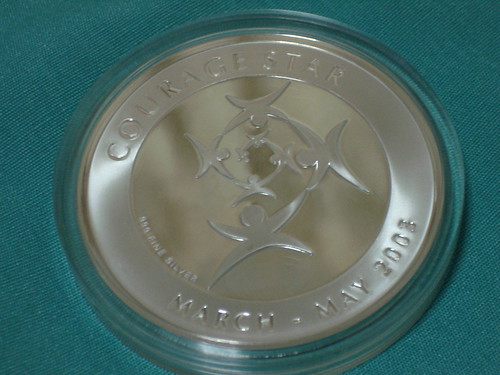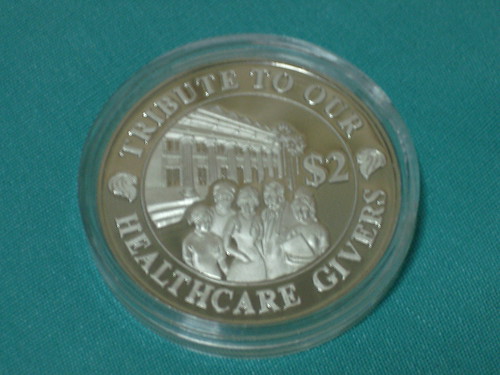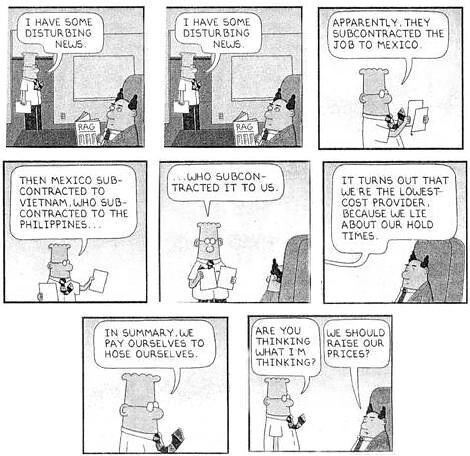Mr Koo, whose letter I featured in a previous entry, has made a comment on this blog. Now this is probably off the usual scope of the blog, but he argues his case well and I thought I should reproduce it here:
Hi.
I am zhixuan. I am stimulated by some of the arguments you've made against mine. Many are very relevant (or perhaps over-used) arguments that are present today against globalisation as a whole.
First and foremost, I am not one who supports globalisation or cross-border trading of goods and services without restraint. I believe there should be a certain amount of regulation. The consequences of not doing so would be disastrous (the point you made of the rich getting richer and the poor being poorer). As it is in Kofi Anan's opinion, 'Globalisation is not an objective reality, but an ideology of predatory capitalism'. I believe this sums up your arguments against the outsourcing of the radiology profession. And this is absolutely true in the world today. The breakdown of the Cancun trade talks in 2003 allowed the world to finally understand the frustration felt by Third World countries
But to see these obstacles and cease taking this path is suicide. In fact, my reply to Dr Low's comments should not be seen as an idealistic advocation for greater liberalisation of free trade in all industries. My reply is simply an attempt to rationalise what I've observed in the real world today. That is to say, while we are still here debating and bickering about what should or should not be 'globalised', millions are already embracing this revolution. Not just the rich, but the poor are beginning to come to terms with it as well. Globalisation, in my opinion, is no longer an ideal concept, but a prevalent phenomenon that will continue to impact all industries and professions. How much we progress will not be determined by whether we accept the realities of globalisation, but how we employ them to our advantage.
The cost of the Industrial Revolution was more than the costs of buying and maintaining machines. There was also exploitation of the workers in the forms of child labour, hazardous work conditions, and poor or absent benefits. Even today many workers in factories in Developing Countires work under such conditions. We may be beneficiaries, but let's not forget there are also victims when we 'move forward'
A gentle reminder would be that the exploitation of workers is an act of injustice prevalent since the birth of commerce. No doubt that before, during and after the revolution, the exploitation of workers was always an issue. Even today, it can be found in the most closed up regimes (North Korea etc). Similarly, it can also be found in socities promoting the free market economy (USA, UK etc). Yet it is in the very process of moving forward, opening up to other countries that these injustices can be brought to light and be condemned by the international community.
Perhaps not explicitly explained in my original post, the people whom i claimed obstinately opposed the Industrial Revolution were simply using the 'costs of buying and maintaining machines' as an excuse. These were workers who couldn't accept the fact that they had lost their jobs to machines, which could perform the same duties so much more cheaper and efficiently. Instead of accepting the change and finding out how they can adapt and be valuable to the new economy, they went around committing acts of terror, i.e. setting fire to factories, killing industrialists. Forgive my impudence, but if you scale their actions down a few times, they would very clearly resemble those who are against the outsourcing of radiology today.
...If a poor man who has only 20 cents wants to buy the last loaf of bread from a baker to feed his family, would you offer the baker 50 cents for that loaf of bread just because you don't want to spend a dollar getting it from your usual baker?
The answer is yes. In the free market, I, as a consumer, am obliged to choose the lowest available price for any given good/service. (To the hyprocrites who say no, i suggest you stop wearing clothes and consuming food imported from foreign countries. For I can assure you that many people 'suffer' too for every new Giordano T-shirt you put on, every bite of that MacDonald's burger in your capitalistic hands). I understand, however, that in giving this baker 50 cents, I will be making him richer than if he had sold that loaf of bread to the poor man. And with this 50 cents, the baker will turn around and look at the poor people around him. He sees the poor man who wanted to buy his loaf for 20 cents and decides to use the 50 cents to buy the vegetables the poor man sells for a living. Not out of compassion, but because this baker wants and can now afford to eat vegetables. This poor man is now 50 cents richer. He might not have the bread he originally wanted, but using the 70 cents he now rightfully possess, he realises he is able to feed his family much more sufficiently than he had been before.
If you have read economics, you wouldn't look at the above as idealism, but a classic analogy of the multiplier effect of macroeconomics. Perhaps we are all, at times, guilty of the mistake of putting ourselves above economic mechanisms (The engines of which are the assumptions of consumer rationality and individual rights). Perhaps it is time to start trusting the Invisible Hand, and instead of interrupting a win-win situation by our self-imposed moral high ground, we should allow the market to take its own course. When 2 parties are willing to come together to trade, allow them! Who are we to put a halt to this? As Adam Smith so aptly concluded, 'It is not from the benevolence of the butcher, the brewer, or the baker that we expect our dinner, but from their regard to their own interest'.
I wonder how happy Mr Koo will be when the day comes that Singapore becomes a successful medical industry exporter and when all our best and brightest doctors have been exported to work in Developed Countires, and Singaporeans themselves cannot get adequate or timely healthcare. Import cheaper doctors from overseas? Well, why would them want to work for you when there are obviously higher bidders who have already bought your doctors?
The problem with many Singaporeans today with regards to the issue of globalisation is the failure to have a paradigm shift. Many see globalisation as a threat to a small country like Singapore. Considering our size, what future would there be for us if we open up and allow billions of foreigners to compete for our jobs? Instead of fearing that 6 billion would want to squeeze and compete with 4 million, I would choose to see the opportunities that can be reaped when 4 million are brrought to a market of 6 billion. If this isn't your perspective, you have certainly not understood the problems facing our economy today-which is one reaching saturation point; graduates are having difficulties getting the jobs they want; the government urging us to expand abroard; the government's desperation in signing Free-Trade Agreements (to that extent that they can support imperalism-US' war against Iraq) etc etc. Perhaps before worrying about emptying our supply of local doctors in the event where we export all of them (an unrealistic presumption by the way, just look at the ratio of number of people applying for medicine vs number of people studying medicine. Once again, trust the market forces! If Singapore would become such a powerful medical hub, the number of medical students will definitely increase proportionately!), we should worry instead that if we allow the medical profession to be immune to the forces of globalisation, so too will the other professions and the industries want to follow suit. And if you do not think others have a case like yours, the next time you meet a retrenched plumber, try explaining to him that he deserve to lose his job to cheaper foreign workers but not doctors because doctors are more important than he is in serving the local population.
Back to my first point regarding the Cancun trade talks, the poor aren't against globalisation as we might so think. They are against double standards set by the developed countries. For example, when they follow the rules set by WTO by allowing firms of developed countries to build factories on their land to exploit cheap labour, they feel betrayed when these countries erect tariffs as a form of protectionism against their relatively cheap exports. It is not globalisation that harms the poor, but the denial of the advantages they rightfully deserve to enjoy. Ban the outsourcing of radiology, ban the takeover of US ports by Dubai-based firms, you will safeguard the jobs and income of the local population, but do not, DO NOT expect those of the Third World countries to be grateful.
If you want to know more of where I stand, you might consider reading Thomas Friedman's 'The World is Flat' and Richard Florida's 'The Flight of the Creative Class'.
Thanks for allowing my article to appear on your blog. I am honoured. All the best to you! :)
Thank you, zhixuan.
Understanding that capitalism can be 'predatory' and that globalisation may not always be fair to all parties involved does not mean that one automatically has to reject capitalism and globalisation. This is a false dichotomy. As you have said, it is not the concept of globalisation that is wrong, but the way it is being practised. Globalisation can be more than just exploitation of a poorer nation's labour or resources, it can also be tempered with regard for the needs of other nations.
We, as consumers, are not helpless victims in a grand scheme that is inexorable or irreversible. We make our voice heard every time we excercise our choice and vote with our wallet. We are not 'obliged' to go for the cheapest or fastest goods or services. We can pick the ones that come from a business where workers are treated fairly, or that which harms the planet less. We may spend more, or have to put up with less efficiency, but we have a choice.
What I am advocating is an awareness that efficiency do not always equate to happiness, and that profit do not always equate to good.
Labels: letters













